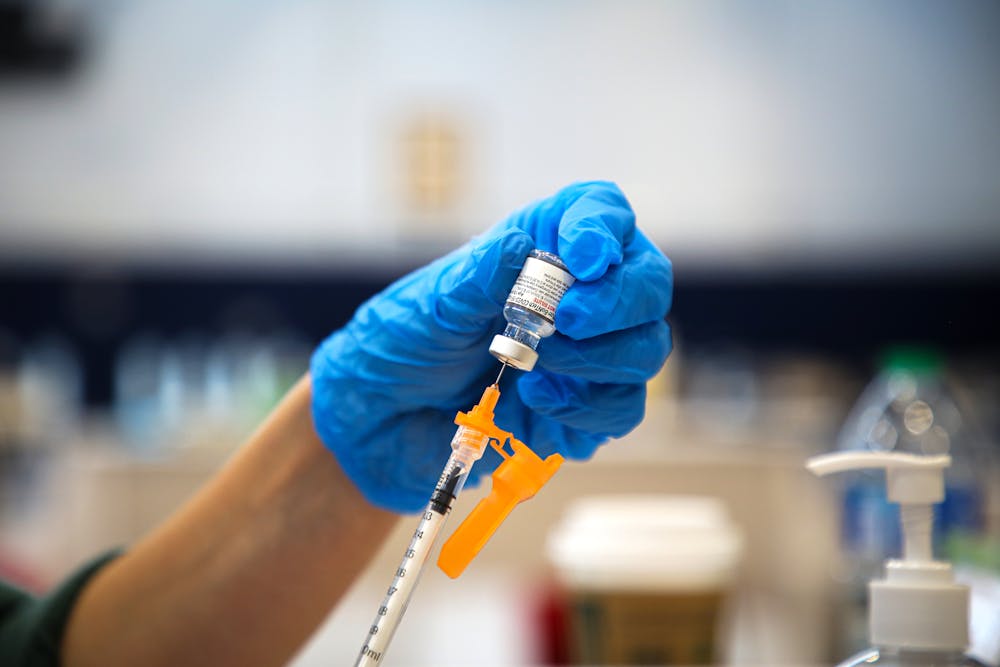
Penn had announced that all eligible students, faculty, postdoctoral students, and staff are required to receive a COVID-19 booster by Jan. 31.
Credit: Jesse ZhangStudents on campus reported mixed feelings about the booster mandate and shared concerns over the lack of double-masking enforcement and non-hybrid class options amid the spread of the highly contagious COVID-19 variant.
Between Jan. 23 and 29, the COVID-19 positivity rate has more than doubled among undergraduate students. On Dec. 21, 2021 the University had announced that all eligible students, faculty, postdoctoral students, and staff are required to receive a COVID-19 booster by Jan. 31.
Elizabeth McKeown, a sophomore in the College, is immunocompromised. Getting COVID-19, she said, would be "incredibly dangerous" for her. Since the pandemic began, McKeown has rarely left her residence to avoid being infected by the virus. The booster mandate, she said, protects students like herself.
“I understand that people are tired of the pandemic and want to start going out, but what I don't think that they realize is that 'I do, too,' you know? Disabled people want to go out, too,” McKeown said.
Some students said that they felt the University’s COVID-19 policies — such as double-masking, testing, and isolation — are not being enforced with enough rigor.
Engineering sophomore Ismat Agwedicham said she did not see the purpose of the University policy that stipulates the use of double-masking or a KN95 or N95 mask when it is not strictly enforced.
“The double masking policy shouldn’t even exist, it’s not being enforced,” she said. “You can wear a single mask and nobody would care.”
McKeown said that she believes Penn's “biggest failure” is the current amount of time allowed between COVID-19 tests which she said allows students to spread COVID-19 without being detected quickly enough. In Oct. 2021, over 9,000 students received a red PennOpen Pass for non-compliance with the biweekly testing policy. McKeown hoped that the University would revert to mandated weekly testing, as in spring 2021.
Penn recently updated its isolation guidelines to match the Centers for Disease Control and Prevention's policy. Fully vaccinated members of the community need to isolate for five days after a positive COVID-19 test and mask around others for an additional five days after isolation. This is in contrast to the previous 10-day isolation requirement, according to Penn's Quarantine and Isolation Guidance page.
McKeown said that the shortening of the quarantine period to five days is “incredibly dangerous.” She said that she had seen instances in which students were released from isolation despite being symptomatic.
Enforcing hybrid options for courses could be one way to protect students who are vulnerable. However, McKeown said many of her professors don’t record their lectures, and it has been difficult to obtain accommodations.
“I've been met with a lot of pushback from teachers who say that their classes are weed-out classes, or that they're trying to catch students who don't care [to attend class in-person], when truly all they’re catching is COVID-19,” McKeown said.
On Jan. 22, second-year doctoral student in ethnomusicology Vincent Kelley started a petition — with the assistance of fifth-year doctoral student in neuroscience Ilenna Jones — that called on Penn to revoke its booster mandate for students.
“People shouldn’t be required to get a booster to protect others since the booster does not prevent infection from COVID-19 nor does it prevent transmission of the virus by boosted individuals who are infected,” Kelley said in an interview with the Daily Pennsylvanian.
Some students agreed with Kelley, saying that despite receiving a booster vaccine for COVID-19, they still tested positive.
“The benefits of a booster in terms of stopping transmission are not really strong. I got COVID-19 when I had three shots,” second-year doctoral student in religious studies Hallie Swanson said.
Jones echoed Swanson, saying she tested positive for COVID-19 just two weeks after her booster shot. Swanson said that the health-based and transmission-based justifications for a booster mandate did not appear “tenable” to her.
However, Agwedicham and McKeown both believe Penn's booster mandate is important to ensuring the health and safety of the immunocompromised and vulnerable.
“I think that people who say that 'it's their body, their choice' are prioritizing their own beliefs over the health of the people around them, which I think is unfair,” Agwedicham said.
The Daily Pennsylvanian is an independent, student-run newspaper. Please consider making a donation to support the coverage that shapes the University. Your generosity ensures a future of strong journalism at Penn.
Donate






